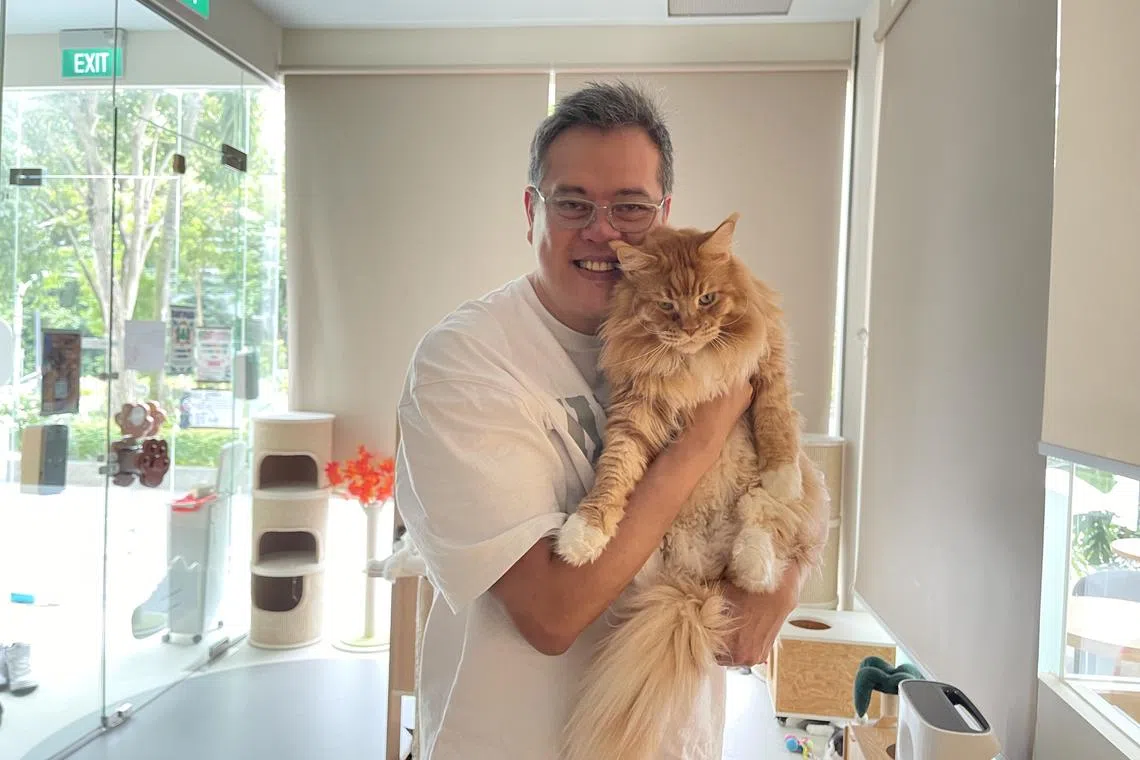Ex-offenders find community and ‘family’ at The Caffeine Experience
The social enterprise provides jobs for ex-offenders which helps turn their lives around
[SINGAPORE] Adrian Ho was not serious about being a barista when he first approached managing founder of The Caffeine Experience (TCE) Matthew Poh for a job in 2017.
The disinterest was apparent as Ho, an ex-offender, left TCE twice for other jobs. But third time’s the charm as he rejoined TCE in 2024 after encountering setbacks elsewhere, and is currently the deputy manager of the company’s Star Vista outlet.
Calling the social enterprise a “safety net”, he said that working at TCE has helped him mature and also allowed him to help other people.
Giving people like Ho a second chance in life is the reason why Poh, an ex-offender himself, founded the social enterprise in 2017.
Starting over with a new mindset
As a one-time bankrupt, two-time divorcee, three-time addict and someone who was incarcerated four times, Poh said he saw the experiences as an opportunity to do good and help others who are in similar situations.
The idea for TCE came about when Poh was discussing with his cellmates about how hard it was for ex-offenders to find employment. As someone with extensive business experience – after graduating from the Singapore Institute of Management, Poh worked in the interior design industry for about 20 years – he wanted to establish a business that helped ex-offenders.
Navigate Asia in
a new global order
Get the insights delivered to your inbox.
He decided to start a cafe business because jobs for electricians, plumbers and interior designers require a licence, or higher skill levels that are difficult to pick up.

Around nine years ago, an investor put S$60,000 into TCE. Now, the company turns around S$1 million a year, employing some 20 people across its outlets.
TCE employs those who have served a prison sentence and have been recommended to them – usually by statutory board Yellow Ribbon, which works to integrate inmates and ex-offenders into the workforce.
“It’s my job to build a community, pulling all my brothers out (from prison) and into a different (life),” he noted. To this end, the company also has counsellors working with its employees – who are all ex-offenders.
By employing them, Poh hopes to turn their lives around. He noted that if this group of people do not have help, they may go back to their old lives, adding: “But with this building of their mindset and helping them (to) adjust, they (can) start a different life. The next generation will see the immediate change.”
Even though he acknowledged that food and beverage is not the “best industry” since returns to shareholders have not been great, knowing that he has helped ex-offenders has been rewarding.
He added that if he continues with this job for 20 more years, he can probably help another 30 to 50 ex-offenders turn their life around.
Loyalty
TCE differentiates itself from other social enterprises that help this demographic because Poh himself is an ex-offender. He said: “I connect with them because I am one of them.”
Just like Ho, many employees leave TCE, but later return due to the prejudice they face at other companies, feelings of fear or insecurity, or because they are not accepted. Poh said TCE is like a “family” where “we accept them for who they are”.
This loyalty might not be seen at other establishments – especially in the F&B industry, which has the highest turnover rates compared to other industries, based on Ministry of Manpower data from 2023.
Training is also essential to the business, Poh said.
“Business is not about how I – as a boss – pay the people, set the task, and they do the work. It’s about personal interactions, and teaching and guiding,” he said. “The key is to work with your team, build their skills, empower them, and guide and train them.”
He credits his staff for helping TCE pull through Covid, when it was badly hit – just like other establishments. TCE was left with only one outlet, down from five at the time.
“It was tough,” Poh recalled. “We could barely make it, and at that point we wanted to give up due to lower sales… While facing that... the boys carried us through the entire period.”
The company focused instead on finding new locations with a better costing ratio.
Calling rent a “killer”, Poh said: “We embarked on reaching out to organisations that have spaces to operate a cafe, but do not want to invest in setting it up. They can provide us with that space. It is a win-win situation since they can operate a cafe to serve their customers or staff. We get rent-free space to support hiring ex-offenders.”
TCE currently operates five outlets: at Star Vista, which doubles as a cat cafe; Urban Redevelopment Authority Centre; Home Team Science and Technology Agency office; Temasek’s office and the Ministry of Sustainability and the Environment’s cafeteria.
Poh added: “We go for locations where the rentals are lower, or if there is an organisation that supports us. The main thing is to provide jobs for my boys. They have jobs that can last for a while.”
Decoding Asia newsletter: your guide to navigating Asia in a new global order. Sign up here to get Decoding Asia newsletter. Delivered to your inbox. Free.
Copyright SPH Media. All rights reserved.



